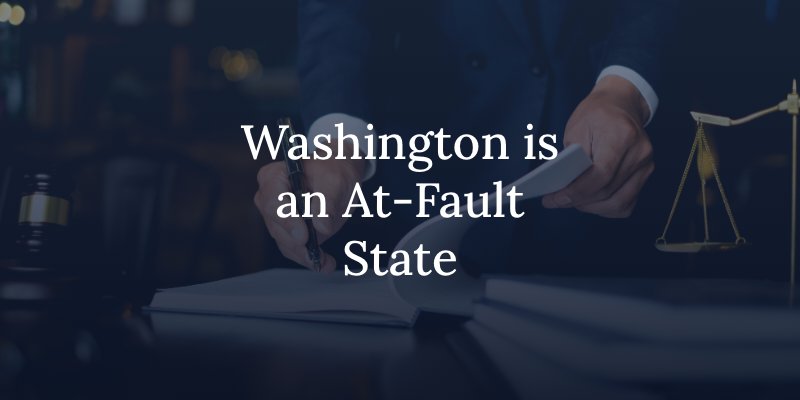Is Washington a No-Fault State?
A no-fault state refers to how insurance claims and compensation for injuries are handled after a car accident. In a no-fault system, each driver’s insurance policy is responsible for covering their own injuries and damages, regardless of who was at fault for the accident.
Washington, however, is an ‘at fault’ state, also known as a ‘tort’ state. In Washington, the at-fault driver is responsible for covering the damages in the event of an accident. This system allows the injured party to file a claim with the at-fault driver’s insurance or pursue a lawsuit for additional damages if necessary.
Fault-Based System (Tort Law)
In Washington, if you’re involved in a car accident or another situation causing personal injury (like a slip and fall), the person who caused the accident (the at-fault party) is legally responsible for paying for the damages. This includes medical bills, property damage, lost wages, and pain and suffering.
If you’re injured in an accident, you can file a claim with the at-fault party’s insurance company. This means proving that the other party was at fault, which is essential for recovering compensation.
If the at-fault party’s insurance doesn’t cover all of your damages, or they don’t offer a fair settlement, you can file a personal injury lawsuit to seek additional compensation.
Comparative Negligence in Washington
Washington follows a pure comparative negligence rule. This means that if you are partially at fault for the accident, your compensation can be reduced by the percentage of fault assigned to you. For example, if you were 20% at fault and your damages amounted to $100,000, your compensation would be reduced by 20%, leaving you with $80,000.
Even if you’re more than 50% at fault, you can still recover compensation, but it will be reduced according to your degree of fault.

Personal Injury Protection (PIP)
Washington offers Personal Injury Protection (PIP) coverage as an optional part of auto insurance policies. If you have PIP, your own insurance will cover medical bills and other related expenses up to a certain limit, regardless of who was at fault in the accident. PIP can be useful if the at-fault party’s insurance delays payment or if fault is being disputed.
Statute of Limitations
In Washington, the statute of limitations for filing a personal injury claim is three years from the date of the accident. If you miss this deadline, you may lose your right to seek compensation.
Common Types of Damages Recoverable
Different types of damages are available to people in Washington State. These include:
- Economic Damages: Medical bills, lost wages, property damage, and other quantifiable financial losses.
- Non-Economic Damages: Pain and suffering, emotional distress, and loss of enjoyment of life.
- Punitive Damages: These are rare in Washington personal injury cases and are typically only awarded in extreme cases of reckless or malicious behavior.
If you were involved in an accident, you would likely start by contacting the at-fault party’s insurance company or pursuing a claim through your own insurer if you have PIP coverage. If the insurance settlement doesn’t cover your losses, you might consider filing a personal injury lawsuit with the help of an Everett personal injury attorney to seek further compensation.
Moving Forward
If you’ve been injured in an accident, you may be entitled to compensation. Our attorneys are available to discuss your situation and provide information about your options under Washington law. At Brumley Law Firm, our attorneys have experience handling personal injury cases and can evaluate your situation to help you determine possible next steps. Contact us today to schedule a consultation by calling (833) 832-2727 — no cost and no obligation to hire. We’ll guide you through the legal process so you can concentrate on healing.